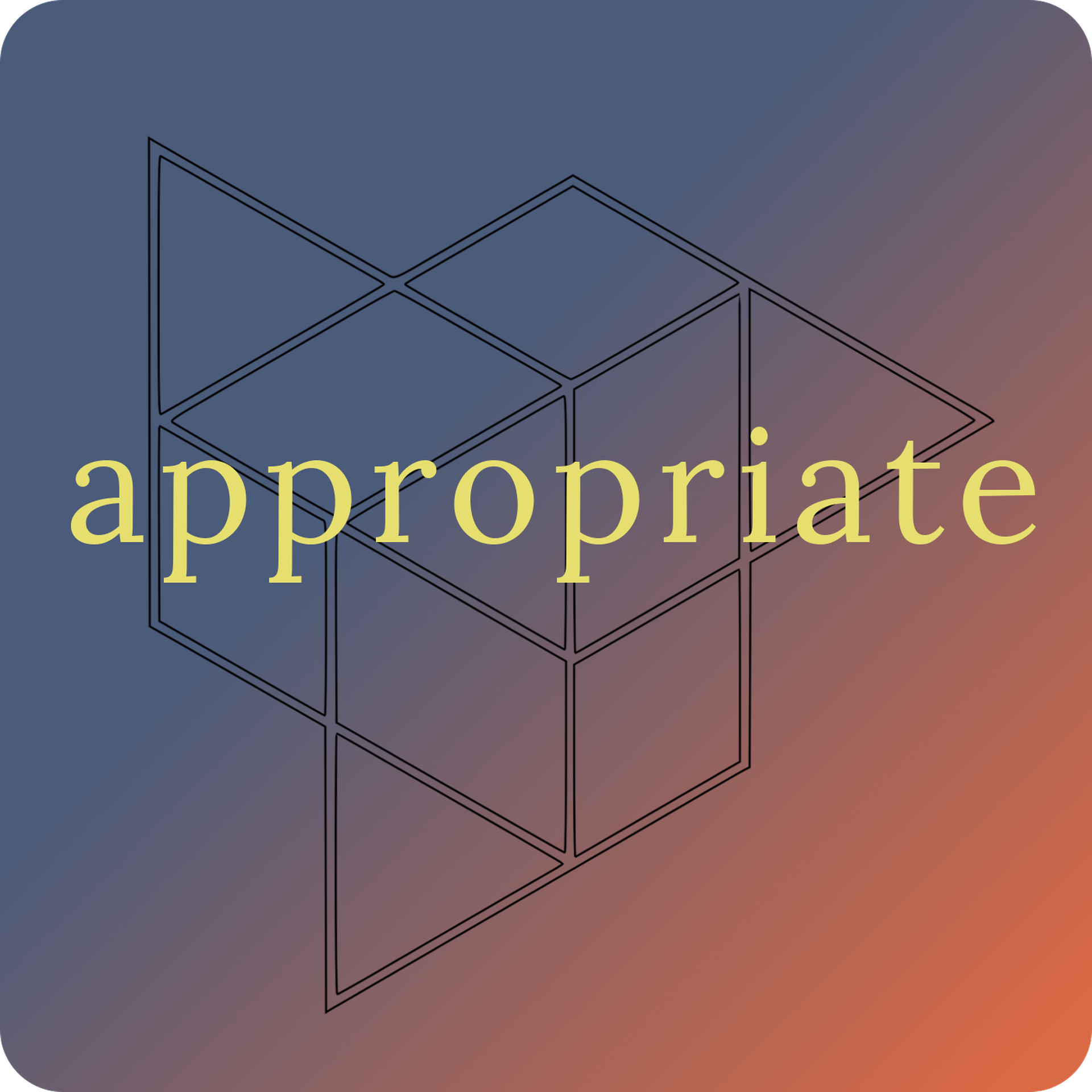Podcast
Appropriate – der Podcast
APPROPRIATE explores different dimensions of ownership, its political dynamics and social impact, and ventures into thinking about alternatives to ownership. APPROPRIATE brings together researchers from different disciplines, activists and policy makers to discuss their perspectives on a wide range of topics, including the sharing economy, urban commons, housing, natural resources, reproductive medicine and bioeconomy. APPROPRIATE is the podcast of the Collaborative Research Centre "Structural Change of Property" of the Universities of Jena and Erfurt (SFB TRR 294).
Music: CC BY-SA, Song Paper Tiger's Grip by Mid-Air Machine
For questions or contributions to the podcast, please write to appropriate_podcast@protonmail.com!

Trailer

The trailer gives a small insight into the intention of the podcast and its topics.
Trailer of the podcastProperty rights versus tenants: Beata Siemieniako on the restitution of housing in Poland
Unregulated restitution of property to prewar owners (or rather their legal successors) remains a major source of conflict over housing in Poland, most notably in Warsaw. This episode features Beata Siemieniako, a Warsaw lawyer and urban activist who has been supporting tenants in their struggle against ruthless developers for years. In her book „Re-privatising Poland. The History of a Great Scam“ (Reprywatyzując Polskę. Historia wielkiego przekrętu, Warsaw: Wydawnictwo Krytyki Politycznej 2017), she tells the story of conflicting claims to urban property and reflects on the pitfalls of restituting past property orders while neglecting present-day social rights. Florian Peters has talked to her about law, grassroots activism, and the impossibility to achieve justice by trying to turn back time. This podcast is a co-production with the Urban Political Podcast.
Guests: Florian Peters, Beata Siemieniako
Listen to on:
Residential Property, Couples, and New Logics of Inequality in the Asset Economy – A Conversation with Lisa Adkins

In this episode, Robin K. Saalfeld engages in an insightful conversation with Lisa Adkins, a noted Professor of Sociology at the University of Sydney. Their discussion traces the narrative of Adkins's book, "The Asset Economy. Property Ownership and the New Logic of Inequality," (2020) co-authored by Martijn Konings and Melinda Cooper. Their thought-provoking work charts the emergence of an asset economy marked by property inflation, a term used to describe the escalated rise in the value of housing assets. The unfolding of this phenomenon paves the way for a new perspective on inequality, primarily focusing on market-driven economies like Australia, the US, and Great Britain. The shift from traditional commodification to a more asset-centered approach, especially in the housing sector, forms a significant part of their narrative. The dialogue further expands as Robin K. Saalfeld introduces empirical data from the research project B06 exploring property inequality among German couples. Through extensive interviews with 50 German couples, the research highlights the crucial role residential property plays for couples. Robin K. Saalfeld and Lisa Adkins delve into the potential characteristics of an asset economy within the German population, raising pertinent questions about the interplay between gender and property ownership. This episode provides a nuanced exploration of the complex tapestry of property, economics, and couple and gender dynamics, contributing to an understanding of the evolving nature of inequality in market-centric societies.
Guests: Robin K. Saalfeld, Lisa Adkins
Listen to on:Property and Territory in Russian History and Geography - A Conversation with Vera Smirnova
In this episode, Hanna Hilbrandt and Markus Kip talk to Vera Smirnova, a human and political geographer to discuss property and territory from a Russian perspective. Smirnova’s genealogical account moves from the Czarist period to this day, illuminating also the current Russian invasion of the Ukraine. Smirnova offers a tour de force through Russia’s moving history of the last 150 years, addressing practices of serfdom, enclosures in the early 20th century, land collectivization following the Russian revolution and waves of privatization after 1991. Throughout this period the institution of property is shown to be fuzzy, insecure, and informal, a legacy that continues to this day as evidenced in current urban planning legislation and extra-legal practices of land grabbing. Similarly reflecting a pliability for powerful political interests, territory has been historically considered as vast, borderless and expansive. The episode is a collaboration with the Urban Political Podcast and is part of the “Urban Lives of Property” Series.
Guests: Markus Kip, Vera Smirnova, Hanna Hilbrandt
Listen to on:
Wohnen und Energie als öffentliche Infrastrukturen – Kommunalisieren, Vergesellschaften, Enteignen?

Wohnen und Energie sind Teil der öffentlichen Daseinsvorsorge. Im Zuge von Krisen wird deren Organisation und Eigentumsform diskutiert. Vorschläge sind die Überführung von privatisiertem Eigentum in öffentliches Eigentum. Im Bereich Wohnen geht die Kampagne „Deutsche Wohnen und Co. Enteignen“ noch weiter und fordert eine Vergesellschaftung von Wohnraum. Auch im Bereich Energie gibt es solche Forderungen und auch schon eine konkrete Umsetzung beim Verein BürgerEnergie Thüringen. Doch inwiefern unterscheidet sich die geforderte Vergesellschaftung von der Kommunalisierung? Welche Herausforderungen gilt es zu beachten? Und ist kommunales Eigentum immer sozial gerechter als Privateigentum? In dieser Podcastfolge kommen Perspektiven aus der Wissenschaft, Zivilgesellschaft und der Politik zu Wort. Ein Podcast mit Silke van Dyk (Co-Sprecherin des Sonderforschungsbereiches), Raul Zelik (Schriftsteller und Sozialwissenschaftler), Sebastian Kohl (Soziologe), Cara Röhner (Juristin), Joanna Kusiak (Aktivistin bei DW und Co. enteignen), Reinhard Guthke (Vorstandsvorsitzender BürgerEnergie Thüringen e. V.) und Florian Schmidt (Bezirksstadtrat Berlin).
Guests: Silke van Dyk, Joanna Kusiak, Florian Schmidt, Reinhard Guthke, Cara Röhner, Sebastian Kohl, Raul Zelik
Listen to on:Carbon sinks as Global Commons
Part III of the "Global Commons" series
In the third episode of our mini-series about Global Commons, we hear from Megan Blomfield, a senior lecturer in political philosophy at the University of Sheffield. Her research concerns global justice and the environment, focusing on the problem of climate change, which you can read more about in her 2019 book, Global Justice, Natural Resources, and Climate Change. In today’s episode we explore carbon sinks as global commons. Because the issue of climate change concerns how we use and share carbon sinks like the atmosphere, the concept of the global commons has been used to invoke more equitable sharing of carbon sinks. However, Blomfield will show us that this conception isn’t so straightforward when we consider carbon sinks more widely, like land and ocean based sinks.
Guest: Megan Blomfield
Listen to on:
Reconstituting the Seabed as a Global Commons: What Would it Take?

Part II of the "Global Commons" series
In the second episode of our mini-series about Global Commons, we hear from Isabel Feichtner, a current Fellow at the New Institute, where she works on Global and Urban Commons and in particular Commons Public Partnerships. In this episode, we will be focusing on a specific global commons- the deep seabed. Feichtner expertly shows us how the deep seabed regime, often hailed as a successful example of international cooperation and management of a global commons, has actually developed with an economic extraction focus to the detriment of distributive justice and environmental protection.
Guest: Isabel Feichtner
Listen to on: